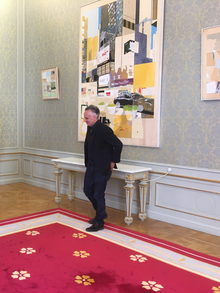Detlef Waschkau

Detlef Waschkau (* 1961 in Hanover ) is a German sculptor and painter .
Life
Waschkau studied from 1985 to 1992 at the Fachhochschule Aachen (Department of Design) sculpture, sculptures, from 1992 to 1995 at the University of the Arts Berlin (now UDK Berlin) Fine art and sculpture. In 1995 he was a master student of Joachim Schmettau . In 1996 he received a grant from the Kulturfonds Foundation . From 2002, Waschkau regularly visited Japan, where he lived and worked mainly in Osaka. Since 2011 he has been traveling to China to get to know the country, to work and to exhibit there. He is a member of the German Association of Artists . Detlef Waschkau lives and works in Berlin.
plant
In his sculptural work, Waschkau is always concerned with issues of space and plastic effect, as well as with the structure and texture of surfaces. This is not only done in three dimensions, but in relief-like surface treatment, so that works are created that have layers of depth, but can also be addressed as images due to their relative two-dimensionality. His image objects he puts in plywood panels of poplar on. In the production of plywood, four thin layers of wood are glued together under pressure. Waschkau removes the upper layers with a hammer and chisel , so that the motifs of his art can develop with the differences in height. The character and the statement of the work are formulated at the same time by painting, which covers the light brown plywood in passages. Painting takes place from the beginning and in the process of work. In this respect, Waschkau's artistic method is to be understood as a parallel sculptural and painterly design, as a montage-like mix of artistic techniques. Lately he has mostly been working from photographic templates that he himself has specifically photographed on site. Often his motifs show architecture and urban landscapes, also people, groups and portraits.
Typical of Detlef Waschkau's art is the detail and a division of the room, which is divided into many rays and details and yet has a wholeness. With such a conception of composition, the artist approaches the density and complexity of today's reality that has been observed on his numerous journeys. Waschkau thus refers to global phenomena that can be observed particularly in the industrially developed zones, where due to planning and technology, series production, manufacturing standards or container transport, the surfaces of urban landscapes, industrial and port facilities are dominated by the geometric, the rectangular and the precisely fitting. With this in mind, the basic shape of his picture objects, laid out in grids, is perfectly created to accommodate and depict the functional architectures of the globally engineered present. Humans also belong in this world, but they hardly appear as an individualized being, but as an anonymous person who briefly joins a group while waiting for the train, then is part of a mass of consumers in order to later go their own way.
Solo exhibitions
2010
- Stadt und Mensch , Kommunale Galerie, Berlin / Galerie am Klostersee, Lehnin
- Lattemann Gallery, Darmstadt
- Essenheimer Kunstverein, with H. vd Goltz
2011
- Mensch im Raum , Kunstraum Bernusstraße, Frankfurt am Main, with H. vd Goltz,
- Mensch im Raum - Galerie Kasten, Mannheim, with H. vd Goltz
- Im Raum , Galerie Tammen & Partner, Berlin
- Heimeshoff Gallery, Roger Schimanski, Essen
2012
- Niederrheinischer Kunstverein, Municipal Museum, Wesel
- Streets from Beijing to Berlin , Kunsthalle Neuffer am Park, Pirmasens
- organic architecture , Galerie Helga Hofman, Alphen, Netherlands
- Eryueshufang Gallery, Beijing, China
- With a different perspective , Gallery 99, Aschaffenburg, with Zhou Dongh
2013
- City motifs and encounters , Kunstraum Bernusstraße, Frankfurt a. Main
- Willy Brandt , Galerie Tammen & Partner, Berlin
- Foreign Positions , Nanjing, China Center of Contemporary art Shang Dong, Nanjing China
- Forum for Art and Architecture, Essen
Awards
- 1996: Scholarship from the Kulturfonds Foundation
Individual evidence
- ↑ kuenstlerbund.de: Members "W" / Detlef Waschkau (accessed December 30, 2016)
Web links
| personal data | |
|---|---|
| SURNAME | Waschkau, Detlef |
| BRIEF DESCRIPTION | German sculptor and painter |
| DATE OF BIRTH | 1961 |
| PLACE OF BIRTH | Hanover |